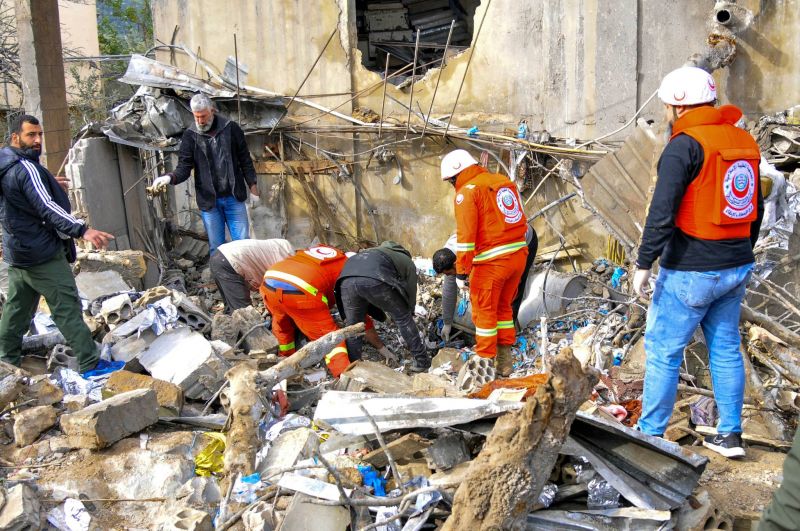
People inspect destruction at the site of an overnight Israeli airstrike in Habariyeh near the Israeli border on March 27, 2024. (Credit: Rabih Daher/AFP)
On Thursday, Hezbollah once again warned Israel, through the voice of several of its leaders, against proportional retaliation to Israeli strikes on Lebanese territory in the event of escalation or expansion of the conflict.
These threats come after Israeli bombardments killed at least 16 people in Lebanon on Wednesday in less than 24 hours. The Israeli army carried out an Israeli strike that killed seven Jamaa Islamiya-affiliated rescue workers in the village of Hebbarieh on Tuesday night, before carrying out two other major operations in the evening, killing nine people in the villages of Tayr Harfa and Naqoura. Faced with this upsurge in violence, the Israeli army spokesman warned that "Lebanese territory in depth was being transformed into a war zone," while Hezbollah carried out a series of strikes in retaliation.
"Expanding the response"
In the morning, Sheikh Ali Daamoush, Vice-Chairman of Hezbollah's Executive Council, told a ceremony in tribute to a Hezbollah member killed in an Israeli strike that Hezbollah would "continue the confrontation" with Israel "to defend Lebanon and support Gaza," and that it would respond "quickly and decisively to every Israeli attack." He stressed that the strikes launched the previous day against the Israeli military base at Meron, as well as on the town of Kiryat Shmona and the occupied Golan Heights, were intended as "direct responses to the Hebbarieh massacre," in which seven young rescue workers lost their lives, and to the strikes in the Bekaa. "Any expansion of the aggression against Lebanon will lead to an expansion of the response," he warned.
MP Ali Fayad, speaking at a religious ceremony in the south Lebanese village of Jibsheet commemorating the death of a Hezbollah member, said that "if the enemy persists in the option of escalation, it must make its calculations carefully because its losses will increase and the problem in the north [of Israel] will worsen." Tens of thousands of Israelis have been evacuated from the border region and Israeli authorities have repeatedly warned that the aim of the current clashes is to keep Hezbollah away from the Blue Line to ensure the safety of Israeli border towns and the return of its residents. "The equation is simple and clear: The Resistance will respond to escalation in the same way. Its retaliation will be more intense, in terms of quantity [of strikes], quality, depth and choice of targets," said Fayad.
He added that "Israel is moving towards the option of military escalation as an alternative to open warfare, as the indicators of recent days show." He also pointed out that "according to Israeli practice, escalation means targeting in depth, as happened in Western Bekaa and Baalbeck, or hitting health or civilian service centers, as happened in Adaisseh and Hebbarieh."
This article originally appeared in French in L'Orient-Le Jour.